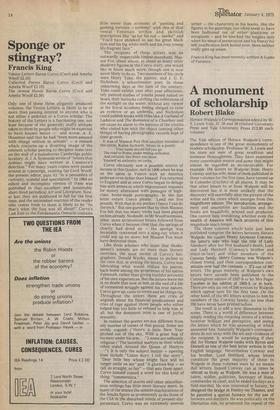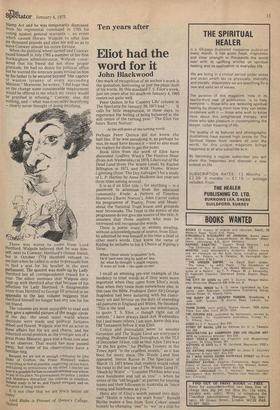A monument of scholarship
Robert Blake
Horace Walpole's Correspondence edited by W. S. Lewis Vols. 37, 38 and 39 (Oxford University Press and Yale University Press £12.95 each volume)
The Yale edition of Horace Walpole's correspondence is one of the great monuments of modern scholarship. Professor W. S. Lewis and his team are men of great erudition and immense thoroughness. They have examined every conceivable source and some that might almost be regarded as inconceivable. For example 194 letters to Walpole from Henry Conway and his wife, most of them published in these volumes for the first time, have turned up in Colombo (Ceylon) of all places. It may be that other letters to or from Walpole will be discovered but it is most unlikely that the discovery will materially alter the picture of the writer and his times which emerges from this magnificent edition. The introduction, arrangement and annotation are faultless and the books are beautifully printed and produced. One cannot help wondering whether even the wealth of America will back projects of this magnitude much longer.
The three volumes which have just been published comprise the letters between Horace Walpole, his cousin Henry Seymour Conway, the latter's wife who kept the title of Lady Ailesbury after her first husband's death, Lord and Lady Hertford (Conway's brother and sister-in-law) and other members of the Conway family. Henry Conway was Walpole's closest friend, and their correspondence constitutes over half the contents — 372 out of 687 letters. The great majority of Walpole's own letters have already been published in the Cunningham edition of 1857-9 or by Mrs Paget Toynbee in her edition of 1903-5, or in both. There are only six out of 246 written by Walpole which appear here for the first time. On the other hand, of the 441 letters written to him by members of the Conway family, no less than 356 have never been printed before.
The result is to add a new dimension to the scene. There is a world of difference between simply reading the outgoing letters of a writer, however brilliant and perceptive, and seeing the letters which he was answering or which answered him. Naturally Walpole's correspondents do not write with the wit and vividness of the recipient. It would be surprising if they did, for Horace Walpole ranks with Byron and Disraeli as one of the best letter writers in the English language. Nevertheless Conway and his brother, Lord Hertford, whose letters constitute the great majority of those to Walpole in these volumes were by no means dull writers. Indeed Conway can at times be almost as lively as Walpole. He was a man of talent, soldier, politician, Secretary of State, commander-in-chief, and he ended his days as a field-marshal. He was interested in botany, he designed the bridge at Henley-on-Thames, and he patented a special furnace for the use of brewers and distillers. He was politically on the libertarian side, he promoted the repeal of the Stamp Act and he was temporarily dismissed from his regimental command in 1765 for voting against general warrants — an event which caused Horace Walpole to offer him SIX thousand pounds and alter his will so as to leave Conway almost his entire fortune. When the political wheel turned and Conway found himself in July 1765 a member of the first Rockingham administration, Walpole considered that his friend did not show proper gratitude. He had no desire for political office but he wanted the sinecure posts settled on him by his father to be secured beyond "the caprice or wanton tyranny of every succeeding Minister." Moreover, he writes, "I did hope that on the change some considerable employment would be offered to me which my vanity would be gratified in refusing." Conway, alas, did nothing, and — what was even more mortifying — clearly never thought of doing anything.
There was worse to come from Lord Hertford. Walpole believed that he was himself, next to Conway, Hertford's closest friend, but in October 1774 Hertford refused to see him when he called in order to persuade him to find a seat for his brother in the next Parliament. The quarrel was made up by Lady. Hertford but all correspondence ceased for a Year. The editor surmises that Walpole only kept up with Hertford after that because of his affection for Lady Hertford. A disagreeable letter from Hertford to George III printed in an appendix to the last volume suggests that Hertford himself no longer had any use for his Old friend.
The volumes are most enjoyable to read and they give a splendid picture of the magic circle of the day, the small inner world where decisions were made and political fortunes ebbed and flowed. Walpole was not an actor in these affairs but his wit and charm, and his inherited social position as the younger son of a great Prime Minister, gave him a front row seat as an observer. That world has now passed away, but some of his observations have a familiar ring.
Because we are not in enough confusion he [the Duke of Grafton, the Prime Minister] makes everything as bad as possible, neglecting on one hand, and taking no precautions on the other. I neither see how it is possible for him to remain minister nor whom to put in his place. No government, no police, London and Middlesex distracted, the colonies in rebellion. Ireland ready to be so, and France arrogant and on the point of being hostile.
It is not clear that we are much better off today.
Lord Blake is Provost of Queen 's College, Oxford.



























 Previous page
Previous page